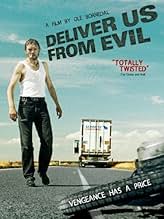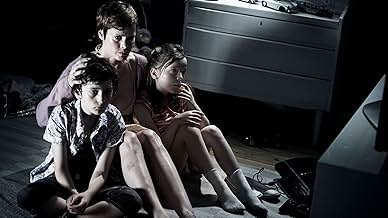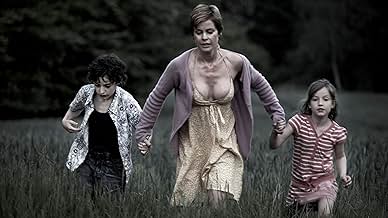IMDb रेटिंग
6.5/10
2.2 हज़ार
आपकी रेटिंग
अपनी भाषा में प्लॉट जोड़ेंA father returns to his old hometown with his young family. Events force him to face the small town's xenophobia.A father returns to his old hometown with his young family. Events force him to face the small town's xenophobia.A father returns to his old hometown with his young family. Events force him to face the small town's xenophobia.
- पुरस्कार
- 5 जीत और कुल 11 नामांकन
Lene Nystrøm
- Pernille
- (as Lene Nystrøm Rasted)
Fanny Leander Bornedal
- Viola
- (as Fanny Bornedal)
Jacob Ottensten
- Frederik
- (as Jacob August Ottensten)
Alexandre Willaume
- Roald
- (as Alexandre Willaume-Jantzen)
Anders Budde Christensen
- Silver
- (as Anders Budde)
फ़ीचर्ड समीक्षाएं
The only good thing about this movie was the acting from Jens Andersen which was excellent. Else this movie was just total nonsense. Exaggerated in every sense and during the entire movie I was thinking what the hell is this. It tries to describe the life of people in the suburb and trying to make it interesting, pointless exaggerated violence is created.
For this movie Ole Bornedal really failed.
the acting from Aqua Lene was also okay.
Lasse Rimmer is bad casted for this movie. He is to nice guy material and gives his part a science fiction feeling
For this movie Ole Bornedal really failed.
the acting from Aqua Lene was also okay.
Lasse Rimmer is bad casted for this movie. He is to nice guy material and gives his part a science fiction feeling
There is a tragic accident in rural Denmark. Accidents, being accidents, can't be predicted and neither can their consequences. Things escalate, but the question is how far, and why, who'll back down first, and why? At the start of the film the narrator hands out some basic background info about the major characters, so you think you understand them and you probably do to some extent, but stereotypes are a major motif here... As one character says "N***er is just a word we use for anyone who's different. They're people too". Does it matter that there's no black people in the film? Well... A bit of racial prejudice, a bit of class prejudice, some personal grudges, basically plenty of reasons for people to see the worst in each other and excuse whatever they do when caught up in a crowd. Including YOUR reasons - you're maybe an urban liberal judging these provincial types, or a refugee judging those who supposedly welcomed you, or someone who didn't get a lucky break in life judging middle class smart-arses. Scapegoats are always handy, like an excuse for a party. An excellent film, shocking and moving but with delicate and humorous moments, somehow the most poignant and supposedly banal touches seem surreal in the context of general nastiness. And no, provincial Denmark isn't really like this, it's just a film. (Having said that, sometimes I've been the only white person on a bus in London and nobody's even noticed me, but as a dark-haired stranger in the Danish countryside I've been severely stared at on buses). Anyway I digress - stop reading these reviews and watch the film. Now!
Xenophobia. Xen-o-pho-bi-a. Noun: an unreasonable fear or hatred of foreigners or strangers or of that which is foreign or strange. The definition of the word does not only describe in one word the main theme of Ole Bornedal's latest film but also the vast majority of main and supportive characters that appear in the story. The writer/director of "Nattevagten" – which still stands as one of the best European thrillers ever made according to yours truly – serves us a simplistic and sadly identifiable story, set in a remote little community where everyone knows and accepts each other but distrusts and reject outsiders. Imagine yourself the type of place where a traumatized war fugitive tries hard to fit in and accept jobs that nobody else wants, but at the same time the local drunks and lowlifes complain that these immigrants are stealing their jobs. This is a controversial but sadly all too familiar topic, and it takes a talented and courageous director to make a confronting – albeit sometimes grotesque and exaggerated – movie out of it.
Johannes and his family return back to his birthplace in the countryside, where they bought an old mansion that he is renovating with the more than welcome help of a Bosnian fugitive named Alain. Most of the town folks are marginal proletarians, however, like Johannes' brother Lars who's an alcoholic, pregnant girlfriend beating truck driver. On the day before the town's annual highlight – a carnival with a beer tent – Lars runs his truck over a sweet old granny who was on her way to the chapel on her moped. Lars frames Bosnian immigrant Alain for her death, which instantly causes the entire town to go on an aggressive and drunken manhunt. Johannes is the only person protecting Alain and they all entrench themselves in the house as the outrageous lynch mob arrives.
I watched "Deliver Us From Evil" at the Belgian Festival of Fantastic Films, where Ole Bornedal was present to introduce the movie himself. He said this was probably the most brutal movie he'd ever make. He's right, of course, but there simply isn't any other way to tell such a raw and shocking but sadly realistic story. According to Bornedal, the media and politicians want to make us believe that bad people only live in the Middle Eastern area, but this movie and its crude but recognizable characters prove otherwise. The comparisons with Sam Peckinpah's early 70's classic "Straw Dogs" are more than justified. Both film slowly but uncannily build up towards a shocking climax that only leaves behind victims. The dead and dying can't repent for the type of sins they committed and even the survivors won't be able to live happily ever after. If you decide to watch "Deliver Us From Evil", prepare yourself for devastating viewing experience, with a continuously unpleasant atmosphere and a number of truly gritty images, that will spook through your head for several more days. But it's more than worth it.
Johannes and his family return back to his birthplace in the countryside, where they bought an old mansion that he is renovating with the more than welcome help of a Bosnian fugitive named Alain. Most of the town folks are marginal proletarians, however, like Johannes' brother Lars who's an alcoholic, pregnant girlfriend beating truck driver. On the day before the town's annual highlight – a carnival with a beer tent – Lars runs his truck over a sweet old granny who was on her way to the chapel on her moped. Lars frames Bosnian immigrant Alain for her death, which instantly causes the entire town to go on an aggressive and drunken manhunt. Johannes is the only person protecting Alain and they all entrench themselves in the house as the outrageous lynch mob arrives.
I watched "Deliver Us From Evil" at the Belgian Festival of Fantastic Films, where Ole Bornedal was present to introduce the movie himself. He said this was probably the most brutal movie he'd ever make. He's right, of course, but there simply isn't any other way to tell such a raw and shocking but sadly realistic story. According to Bornedal, the media and politicians want to make us believe that bad people only live in the Middle Eastern area, but this movie and its crude but recognizable characters prove otherwise. The comparisons with Sam Peckinpah's early 70's classic "Straw Dogs" are more than justified. Both film slowly but uncannily build up towards a shocking climax that only leaves behind victims. The dead and dying can't repent for the type of sins they committed and even the survivors won't be able to live happily ever after. If you decide to watch "Deliver Us From Evil", prepare yourself for devastating viewing experience, with a continuously unpleasant atmosphere and a number of truly gritty images, that will spook through your head for several more days. But it's more than worth it.
The newest Ole Bornedal film is a continued exploration of styles, themes and content not normally associated with Danish cinema. Following the awesome meta-film noir 'Just Another Love Story' and the great children's horror/sci-fi 'The Substitute', 'Deliver Us from Evil' is like no Scandinavian film you've ever seen before. Not to say that this is a wholly original work of art, it's not, however, the combination of all the elements makes it unique as a Danish movie.
In the story, not too dissimilar to Straw dogs, we're in hillbilly territory, where one man tries to do the right thing and has to defend himself and his family against outsiders. Everyone accept the main family acts extremely over the top in a wonderful dramatic way but still strangely rooted in Danish society. You are in disbelief but still you feel that these obnoxious, unpleasant characters could be quite real.
The cinematography by Danish legend Dan Lausten is nothing short of brilliant and all actors shine, even though most of them are cast against type or comes from different backgrounds than movies. 'Deliver Us from Evil' is so well made on all accounts that it can only be described as a Danish masterpiece. It wouldn't necessarily be a masterpiece had it been made in the US, but perfecting the western genre, flirting with horror, making social comments, all grounded in a Danish setting with thrills and kills, this is as good as it's going to get. And Ole Bornedal, once the great talent, has through recent years, enriched Danish film more than anyone, except maybe Von Trier.
In the story, not too dissimilar to Straw dogs, we're in hillbilly territory, where one man tries to do the right thing and has to defend himself and his family against outsiders. Everyone accept the main family acts extremely over the top in a wonderful dramatic way but still strangely rooted in Danish society. You are in disbelief but still you feel that these obnoxious, unpleasant characters could be quite real.
The cinematography by Danish legend Dan Lausten is nothing short of brilliant and all actors shine, even though most of them are cast against type or comes from different backgrounds than movies. 'Deliver Us from Evil' is so well made on all accounts that it can only be described as a Danish masterpiece. It wouldn't necessarily be a masterpiece had it been made in the US, but perfecting the western genre, flirting with horror, making social comments, all grounded in a Danish setting with thrills and kills, this is as good as it's going to get. And Ole Bornedal, once the great talent, has through recent years, enriched Danish film more than anyone, except maybe Von Trier.
the piece who defines the movie is the profound humanity. that fact explains its status of dark sketch. because, more important than story is the admirable acting. a film who seems be a trip in middle of instincts, pain and broken masks, it is, in fact, touching exercise of self definition.the image, the script, the performances are real good. film about sin in its deep dimension, it is religious out of the ordinaries rules of genre. because it is not exactly about the faith but about the sense.because the image is the lead character. a film like a parable. cold, honest, impressing. a special story about the choices and their price. it is not a bad idea to see it. maybe, for discover the world. maybe, yourself. in a different light.
क्या आपको पता है
- कनेक्शनReferenced in Zulu Late Night, Live!: Lasse Rimmer/B.S. Christiansen (2009)
टॉप पसंद
रेटिंग देने के लिए साइन-इन करें और वैयक्तिकृत सुझावों के लिए वॉचलिस्ट करें
- How long is Deliver Us from Evil?Alexa द्वारा संचालित
विवरण
बॉक्स ऑफ़िस
- दुनिया भर में सकल
- $69,513
- चलने की अवधि1 घंटा 40 मिनट
- रंग
इस पेज में योगदान दें
किसी बदलाव का सुझाव दें या अनुपलब्ध कॉन्टेंट जोड़ें























